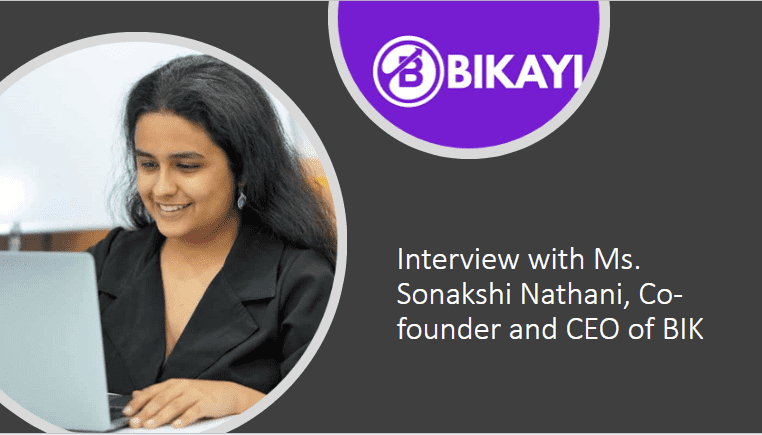Bikayi, India’s popular e-commerce enabler, helps businesses set up their own identity online, and upscale & increase their revenue using the right tools.
Lately, Bikayi has unveiled its new brand identity, BIK. The vision of the company is to make brands limitless and help them leverage the power of conversational marketing with BIK.
Today, businesses and e-commerce platforms are unable to effectively engage with customers through traditional channels such as SMS, emails, and advertorials among others. With enhanced technological penetration, more consumers are looking at personalized messaging and curated products. There is a 70% higher probability of customers making purchases, leading to higher conversions when they are offered a personalized experience. To tap into this tremendous potential, BIK was built to help brands drive traffic and re-engage their customers. In alignment with Bikayi’s vision, BIK aims to help businesses and brands effectively reach out to intelligently segmented audiences and create trust among them with verified WhatsApp accounts and drive maximum ROI.
To know more about BIK, the tools the company is using to increase businesses reach, why the brand has changed its identity, and a lot more; recently we had an interaction with Ms. Sonakshi Nathani, Co-founder and CEO of BIK.

Sonakshi Nathani is a software developer turned entrepreneur with over six years of experience. She founded Bikayi with her batchmate from IIIT Hyderabad Ashutosh Singla (CTO) in 2019. It all started with Sonakshi observing the chaos created by the existing process used in her family grocery business, back in Raipur. When she discussed these problems with Ashutosh, they both came up with a plan to simplify e-commerce for every
business, irrespective of the target audience.
At BIK, Sonakshi takes care of everything, right from building and executing growth-driven strategies, to cementing business partnerships, managing market dominance, and delivering innovation for customers and channel partners.
As CEO, she is a humble go-getter and has built a reputation for helping individuals tackle barriers to success. She is driven by passion and aims to take BIK to greater heights by working toward product development, market penetration, and talent acquisition.
Few bites from our Interaction with MS Sonakshi Nathani
1. What exactly is the reason or need for rebranding?
The idea behind rebranding Bikayi as BIK is to enable brands to relate to our vision more clearly. Previously, we assisted only small and medium businesses in taking their operations online. With the new brand BIK, we envision taking on mid-market and enterprise brands as clients and helping them increase their customer base and become successful with better customer engagement. In addition, we have also expanded our product line by introducing Marketing Automation tools for e-commerce and retail brands.
2. What products are being introduced with this rebranding, if any? Elaborate on the features.
We have recently introduced our new product line with our rebranding, BIK which is the most intelligent e-commerce marketing platform helping brands increase their ROI. Our platform enables brands to do personalized marketing delivering higher conversions and driving up to 66x ROI.
The following features are being introduced under BIK:
- BIK allows marketers to leverage WhatsApp, SMS, email, push notifications, and Facebook and Instagram ads.
- It helps your team convert customer chats to orders.
- It helps configure e-commerce journeys and automate product discovery and support.
- BIK Automated Chatbot helps automate conversions and save 100 percent on agents with an intelligent bot that understands the user’s preferences and guides their purchase journey.
- BIK Growth powers brands with widgets and tools to increase the subscriber base.
3. What type of tools does BIK use to increase the reach and ROI of small businesses?
BIK offers a wide array of features that helps brands acquire new customers and convert visitors into potential loyalists. To improve the shopping experience for your customers, BIK has a wide range of growth tools from widgets that can be set up on your storefront to ads that click to WhatsApp.
With respect to increasing the ROI for businesses, BIK offers tools such as:
• Chatbots
BIK’s intelligent chatbots ensure that no customer is left unaddressed, and the questions of your customers are answered in the best manner possible. The chatbot helps customers in every stage of their purchase journey, whether it is a consideration, actual purchase, or post-purchase support. Your customers not only stay engaged, but you also receive maximum conversions right from their chats.
• Segmentation and targeted campaigns
⇒ Leverage the insights you have about your customers to understand them better and re-target them with relevant and appealing content to get the best engagement rates and returns on your advertising spending.
⇒ Get in-depth analysis and insights on the performance of your campaigns to keep optimizing them for higher returns.
• Customer Relationship Management (CRM) to address customer queries and increase conversions.
⇒ Our CRM supercharges your customer support team and equips them with all the tools they need to address any pre-purchase or post-purchase queries your customers might have.
4. How long does it take for Bikayi to bring an offline business online? Could you please put some light on the steps you follow?
The basic store setup for any business takes two minutes. This includes signing up, catalog upload, product upload, and profile updating. Following are the steps involved in a detailed store setup:
⇒ The first step requires KYC Verification documents from the business owner for the onboarding process to be initiated.
⇒ The business owners need to gather complete information on their store to represent their brand with product images, descriptions, company policies, etc., required for the e-commerce industry.
⇒ Once these details are in place, the business owner needs to upload the UPI details and bank details for a smooth transaction process, and if they have their payment gateway, they can also provide those details.
⇒ The next step is taken care of by the store setup team, which sets up the required banners, logos, and homepage content.
⇒ At last, the store is sent for a quality check team to cross-verify and remove any errors under the product description, image quality, or policies. Once the website is good to go, it is handed over to the business owner.
5. What led to Bikayi’s partnership with WhatsApp and how is it beneficial to the brands?
Based on our insights from regular engagement with partners and market analysis, we understood that brands require new marketing channels which reach out to prospective customers while retaining the current ones. The focus on large e-commerce D2C brands using our WhatsApp marketing tool was an organic choice and an ideal step ahead in strengthening our footprint.
WhatsApp is one of the widely used platforms globally and since customers are more likely to respond on WhatsApp, we launched our new marketing platform BIK.
BIK aims to revolutionize the way e-commerce brands target, re-engage and manage their customers on WhatsApp, helping them drive higher conversions and increase ROI by 66x through its AI-powered intelligent platform.
Our WhatsApp marketing tool enables brands to target customers through intelligent audience segmentation, a pre-designed collection of templates, automated bot messaging, and optimizing marketing strategy through analytics.
6. How does BIK stand out in the e-commerce segment? How is it different from Bikayi?
Today, businesses and e-commerce brands are unable to effectively engage with potential customers through conventional channels such as SMS, emails, and ads, as they have lower open rates. Personalized messages provided by BIK make customers 70% more likely to make a purchase, thus assisting brands in boosting their sales. In the ever-expanding market, BIK.ai enables brands to gain a higher reach by targeting over 2 billion active WhatsApp users every day.
The ability to re-engage with lapsed customers and encourage them to complete their purchases is one of the biggest strengths of BIK. Buyers hesitate to make purchases because they lack personal touch with the brands they purchase from. BIK helps brands build connections with customers through personalized messaging and drive customer engagement up to 3x.
While Bikayi as a product serves small and medium businesses, BIK is a high-engagement platform optimized for global usage. It allows brands to go international with cross-country messaging and a user-friendly interface. Any brand from any part of the world can now avail of the platform to reach wider audiences with seamless communication.
BIK stands out from other players by building an end-to-end e-commerce solution for brands that leverage engaging channels like WhatsApp, Instagram, etc. We help brands right through the e-commerce funnel from the acquisition of engaged subscribers to engagement, support, and re-targeting. Many existing solution providers either focus just on support use cases or do not provide e-commerce-specific deep solutions.
8. Name a few D2C brands which are onboarded with BIK.
BIK is the best-suited tool for D2C brands to drive their business toward profitability and higher margins, using conversational marketing. A few D2C brands which are onboarded with BIK include Bavincis, Cora Health, Bathla Aluminium, Deciwood, Soxytoes, Evolve Snacks, ChocoCraft and Recode Studios.
9. What are some of the trends that you have witnessed in customer shopping behavior and technological advancements?
With changing trends in customer shopping behavior and advancement in technology, there is a major shift toward conversational commerce. Brands now sell directly to customers using messaging channels. Top online brands are monitored with WhatsApp marketing. Over the next few years, consumers are expected to only purchase from brands and products that are selling on WhatsApp, because that is easier and more accessible.
Customers today are looking for relevant recommendations while exploring a brand. Browsing through a large list of generic products or finding the right keywords to search, can be cumbersome in this age of low-attention spans.
Now that brands have access to an abundance of user data, they need to find ways to leverage this and provide tailored recommendations to their customers and help them avoid the paradox of too many choices.

Related Posts
A Conversation with Mr. Alok Khandelwal (Asttrolok): Pioneering the Future of Vedic Science
Interview with Ms. Bhavna V, Co-founder, Nysh.in
The Climateur’s Creed: Shailendra Singh Rao and the Mission of Creduce
How Enterprise Technology is Revolutionizing Business Operations in 2024
A Journey through White Westinghouse Washing Machine Factory
Inside Kodak TV Factory: A Glimpse into the Manufacturing Process